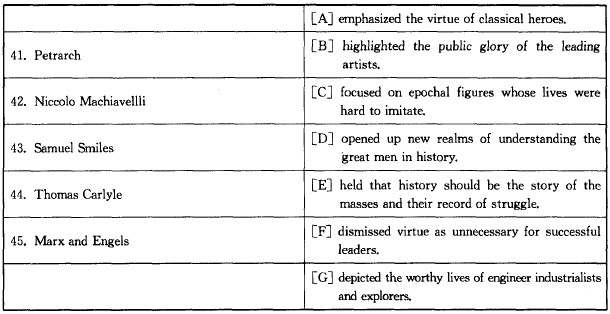2012年考研英语(二)真题试卷
-
Suppose you have found something wrong with the electronic dictionary that you bought from an on-line store the other day. Write an email to the customer service center to
1) make a complaint, and
2) demand a prompt solution.
You should write about 100 words on ANSERE SHEET 2.
Do not sign your own name at the endof the letter. Use "Zhang Wei " instead.
Do not write the address. (10 points)
-
Write an essay based on the following table. In your writing, you should
1) describe the table, and
2) give your comments.
You should write at least 150 words. (15 points)

-
When people in developing countries worry about migration, they are usually concerned at the prospect of their best and brightest decamping to Silicon Valley or to hospitals and universities in the developed world. These are the kind of workers that countries like Britain, Canada and Australia try to attract by using immigration rules that privilege college graduates.
Lots of studies have found that well-educated people from developing countries are particularly likely to emigrate. By some estimates, two-thirds of highly educated Cape Verdeans live outside the country. A big survey of Indian households carried out in 2004 asked about family members who had moved abroad. It found that nearly 40 % of emigrants had more than a high-school education, compared with around 3. 3% of all Indians over the age of 25. This "brain drain" has long bothered policymakers in poor countries. They fear that it hurts their economies, depriving them of much-needed skilled workers who could have taught at their universities, worked in their hospitals and come up with clever new products for their factories to make.
-
(45)
-
(44)
-
(42)
-
(43)
-
The author thinks that the influence of hard times on society is______.
- A.certain
- B.positive
- C.trivial
- D.destructive
-
Read the following text and answer the questions by finding information from the right column that corresponds to each of the marked details given in the left column. There are two extra choices in the right column. Mark your answers on ANSWER SHEET 1. (10 points) ' ,
"Universal history, the history of what man has accomplished in this world, is at bottom the History of the Great Men who have worked here," wrote the Victorian sage Thomas Carlyle. Well, not any more it is not.
Suddenly, Britain looks to have fallen out with its favourite historical form. This could be no more than a passing literary craze, but it also points to a broader truth about how we now approach the past; less concerned with learning from forefathers and more interested in feeling their pain. Today, we want empathy, not inspiration.
From the earliest days of the Renaissance, the writing of history meant recounting the exemplary lives of great men. In 1337, Petrarch began work on his rambling writing De Viris Illustribus — On Famous Men, highlighting the virtus (or virtue) of classical heroes. Petrarch celebrated their greatness in conquering fortune and rising to the top. This was the biographical tradition which Niccolo Machiavelli turned on its head. In The Prince, he championed cunning, ruthlessness, and boldness, rather than virtue, mercy and justice, as the skills of successful leaders.
Over time, the attributes of greatness shifted. The Romantics commemorated the leading painters and authors of their day, stressing the uniqueness of the artist's personal experience rather than public glory. By contrast, the Victorian author Samuel Smiles wrote Self-Help as a catalogue of the worthy lives of engineers, industrialists and explores. "The valuable examples which they furnish of the power of self-help, of patient purpose, resolute working and steadfast integrity, issuing in the formulation of truly noble and many character, exhibit," wrote Smiles, "what it is in the power of each to accomplish for himself. " His biographies of James Walt, Richard Arkwright and Josiah Wedgwood were held up as beacons to guide the working man through his difficult life.
This was all a bit bourgeois for Thomas Carlyle, who focused his biographies on the truly heroic lives of Martin Luther, Oliver Cromwell and Napoleon Bonaparte. These epochal figures represented lives hard to imitate, but to be acknowledged as possessing higher authority than mere mortals.
Not everyone was convinced by such bombast. "The history of all hitherto existing society is the history of class struggles," wrote Marx and Engel in The Communist Manifesto. For them, history did nothing, it possessed no immense wealth nor waged battles;"It is man, real, living man who does all that. "And history should be the story of the masses and their record of struggle. As such, it needed to appreciate the economic realities, the social contexts and power relations in which each epoch stood. For: "Men make their own history, but they do not make it just as they please; they do not make it under circumstances chosen by themselves, but under circumstances directly found, given and transmitted from the past. "
This was the tradition which revolutionized our appreciation of the past. In place of Thomas Carlyle, Britain nurtured Christopher Hill, EP Thompson, and Eric Hobsbawm. History from below stood alongside biographies of great men. Whole new realms of understanding—from gender to race to cultural studies—were opened up as scholars unpicked the multiplicity of lost societies. And it transformed public history too: downstairs became just as fascinating as upstairs.

(41)
-
Benjamin Friedman believe that economic recessions may______.
- A.impose a heavier burden on immigrants
- B.bring out more evils of human nature
- C.Promote the advance of rights and freedoms
- D.ease conflicts between races and classes
2017年心理学考研真题及答案312
2017年考研心理学模拟题1(心理学
2017年考研心理学模拟题2(知识的
2017年考研心理学模拟题3(思维)
2017年心理学考研模拟题1(知觉)
2017年心理学考研模拟题2(心理测
2017年心理学考研模拟题3(人格)
2017年普通心理学考研试题及答案1
2017年普通心理学考研试题及答案2
2017年普通心理学考研试题及答案3

